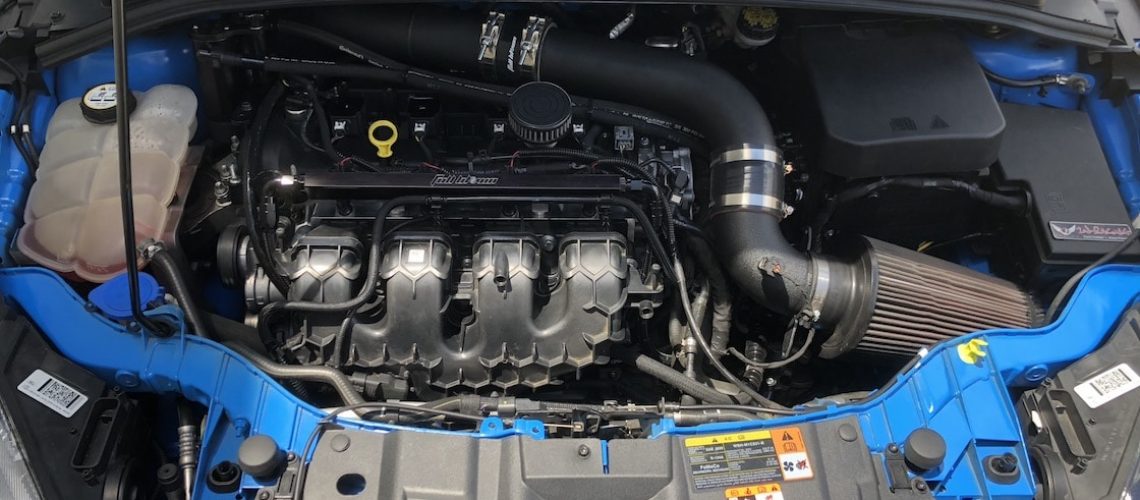I’ve had the “problem” of not being able to leave well enough alone for almost 20 years now. I’ve always been a tinkerer from the time I was a kid. From radio-controlled cars and helicopters to my current hobby, performance cars, I’ve always had this desire to modify what I had in an attempt to improve performance. The list of fun cars I’ve owned over the years includes a Suzuki Samurai (don’t laugh), Volvo 240, Mazda 3 hatch, Evo IX MR (still miss that car), 240SX (Kouki), Honda Civic DX Hatch, Volvo C30 and most recently, an MK3 Ford Focus RS.
I’ve made a lot of mistakes along the way but with that comes a lot of experience which I think is pretty valuable. What I hope to accomplish with this short post is to pass along a few important lessons hoping that it’ll help the reader get through their project faster, cheaper and with less broken parts. Building a reliable tuner car doesn’t doesn’t have to be an impossibility.
With that let’s get started…
Your Goal and Your Budget
Project cars work out best when you begin with the end in mind. Decide what your plan for the car is before you start ordering parts and turning wrenches. For most platforms, a substantial increase in power levels is going to require a built engine, augmented or standalone engine management, specialized parts, and a great deal of tuning. Let’s say your goal is to build a 500 whp Focus RS.
Ask yourself the following questions:
- Has anyone else successfully done that?
- What parts will be required?
- Who will tune the car?
- How will drivability be at that power level?
- How much is the project car estimated to cost?
To answer that last question, I recommend that you add up the prices of all the parts, get a rough labor estimate, and then add at least 20% to whatever that number is. When modifying cars there are often unexpected expenses, so you’ll want to pad your final number to ensure you’re able to complete the project. Things always cost more and take longer than you expect. It’s part of the game. Are you sure you still want that 500 whp?
Finally, once you’ve decided on your goal and budget—stick to it. When there’s constant project creep, it can be frustrating for all parties involved, and most often it results in a shoddier final product.
How to Choose the Right Platform
Your build will be so much easier if you choose the right platform based on your goals. If your plan is to build a lightweight canyon carver, then starting with a used BMW 7 series probably isn’t the best option. The 7 series is an amazing car, but it’s not the best platform for someone with the goal of doing lots of canyon runs.
How I picked my most recent project car.
I love the R34 GT-R. To this day it’s still my dream car. Turbocharged, AWD, manual transmission, and capable of big power reliably. I mean what’s not to love, right? Unfortunately, we can’t easily get them here in the U.S. In the past, my Evo IX MR was my baby GT-R, but it died an unfortunate death less than a month after I got it. If you ever run into me at a car show pull me aside and I’ll tell you the story.
I’d been driving my tuned C30 for a number of years and was ready for something new. When Ford announced that they’d be bringing the Focus RS to the U.S. for the first time and that it would have my personal “Triforce” (Turbocharged, AWD, Manual Transmission), I knew I had to have one. Being an RS, I knew there’d be tons of support in the aftermarket for it. Because it is turbocharged from the factory, I also knew it would have the foundation needed to make big horsepower more easily. For the kind of driving I like to do—80% street, 20% canyon, the RS fits the bill perfectly.
I tell you this story for an important reason. When you’re choosing a platform to sink a lot of time and money into, make sure you begin with the end in mind. Know what you want to get out of the car for the kind of driving you do and choose accordingly.
There are few things worse than spending a lot of money trying to force a square peg into a round hole.
Shop Selection
Unless you’re planning on doing all the work yourself, spend time researching shops in your area that do performance work. Shop selection is an important aspect of building a reliable tuner car. The key things you’re looking for from the shop in order of importance are reputation, knowledge of the platform, and financial stability.
Reputation
Dealing with a shady business sucks. A lot. It’s important to choose carefully because whomever you decide to work with is going to have your car, parts, and money. Based on the types of cars they work on, do a Google search and see what people are saying about them in the forums. This is a bit of a balancing act because most of what you see in the forums are people that had a bad experience vs. ones that had a good one. Still, if the overall consensus is that a shop is bad news, stay away.
Once you’ve narrowed down your list, I’d recommend that you visit each shop in person before you allow them to do any work on your car. If you’re able to see into the actual garage, take note of what it looks like. Is it a mess? Are lots of parts laying around without any sense of organization? When you interview the owner or shop supervisor, do you get the feeling that they’re someone you want to deal with long term? This is a relationship you’re forming so pay attention to that voice in your head if it tells you something is off.
Platform Knowledge
Does the shop have familiarity with your platform? Ask them how many other cars of your type they’ve worked on and listen to how they respond. This one is also a bit of a balancing act because if your car is a relatively new platform, no shop in the area is going to be an expert on it. That said, what you’re mainly looking for is that they feel comfortable working on your car without messing things up.
When I chose my current shop, the owner was very candid when he said that they had not done much work on the RS due to it being so new. However, he did point out that they had extensive experience with similar cars from the same manufacturer even going so far as developing parts for them. They were upfront and honest, which was important to me.
Financial Stability
This is a tough one to gauge but here’s how you can go about it. For starters, research how long the shop you’re considering has been in business. Many performance shops are fly by night not lasting past 5 years. If the shop you’re considering has been around that long, that’s a good start.
Next, take a look at the shop when you initially visit. Pay attention to how many cars are in the shop and the kind of work that’s being done on them. What you’re looking for is a combination of basic maintenance work and bigger projects. This can indicate that the shop is balancing their workload between large projects and quick turnaround stuff. Most often it’s the oil changes, brake jobs, and suspension work that keeps the lights on.
I can’t stress the importance of doing this because the last thing you want is to receive a phone call telling you the shop is going under so you need to come pick up your unfinished car. Worse yet, if the shop is filing for bankruptcy, getting your car back could become a bit of a hassle as the courts work through what is customer vs. shop property.
It happens.
Parts and Vendor Selection
Based on your performance goal, assemble a list of parts that’ll be needed to reach it. Depending on how wild you’re going, this can range anywhere from a set of simple bolt-ons to a large-cam, big turbo, fully built titan of an engine that makes the EPA cringe.
Similar to your performance shop selection, you should only buy parts from reputable manufacturers. Much of the automotive performance industry is plagued with manufacturers that don’t do adequate testing and simply push parts out the door as soon as possible to make a sale. The result is frustration, time wasted, and additional expense since you’re now paying money to have the shop modify parts to make them work.
If your project car requires a built engine, some additional precautions are required. All engine builders are not created equally. Ensure that whomever you work with has done adequate testing before signing on with them. A good builder will find the limits of their assembly through destructive testing before releasing it for sale. For as much time and labor that’s involved with removing and installing an engine, you don’t want to be a beta tester. Engine price alone should not be the deciding criteria.
Some additional questions to ask are:
- What is the vendor’s reputation in the community?
- In the case of damaged or incorrect parts, how are these issues resolved?
- Do they have a restocking fee? If so, how much?
I can’t stress enough that price shouldn’t be the primary criteria by which you decide on the parts to use. Remember that the price of the part is only half of the equation. Unless you’re doing your own work, you’re going to be paying someone to install them.
Ideally, you only want to do this once.
Choosing a Tuner
I could have just as easily called this section “Finding a Wife” because that’s how carefully you need to decide on your tuner. Remember that up to this point all those shiny parts on your car are just expensive paperweights until you have your tuner breathe life into them. The work they do is among the most critical to building a reliable tuner car.
Ideally, you’ll have identified this person when you were establishing your goal and budget and before you started buying parts. Search forums for reviews on the tuner to see what people are saying. Happy customers typically post about how much power their car is making, how it drives, and what the experience was like.
Realize that the best tuners have the heart of a teacher, so work with someone that fits that description. They should be willing to explain the process completely and set realistic expectations. A good tuner should be a vocal partner in your build. Based on your goals, they’ll provide you with a combination of parts they’ve used in the past to achieve the power level you’re after. This saves you time, money, and frustration.
Finally, try your best to work with someone that’s been doing it for a while. The very best option is working with someone whose primary profession is engine tuning. They’ll have more experience, which will decrease the likelihood of problems. Something else to consider is that most tuners consider their work proprietary, so the tune will often be locked. You want to ensure that whomever you work with is going to be around if you need tuning adjustments at a later date.
Tying it Together
If there’s one piece of advice I can give you as you journey into “not being able to leave well enough alone,” it would be to have realistic expectations. When you modify a car (even lightly), you’re taking a known good configuration and changing it. Manufacturers spend countless hours engineering and testing the product they ultimately sell to the public and sometimes even they still get it wrong.
Realize that once you start tinkering, you’re putting yourself in that same role. Things will take longer than you expect. They’ll cost more than you imagine and just when you think you’ve got it right, there’s still a chance it will break. Be prepared to go through a few cycles of build it, break it, improve it until you end up with a reliable setup that you’re happy with. Building a reliable tuner car is definitely possible with the right planning and execution.
I hope you liked reading this as much as I enjoyed writing it. It’s allowed me to remember the toys I’ve built over the years and to relive some fun and not-so-fun experiences. In the end, it’s all part of the game.
Happy Building…




